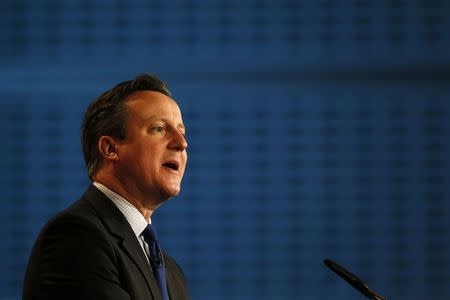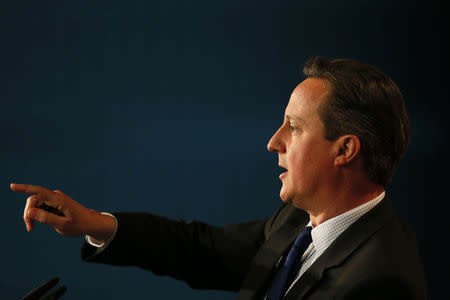Ahead of election, Cameron calls on businesses to boost worker pay
By Kylie MacLellan and Paul Sandle LONDON (Reuters) - Businesses must share the rewards of Britain's economic recovery by boosting pay, Prime Minister David Cameron said on Tuesday, as they in return called for an early referendum on membership of the European Union to help reduce damaging uncertainty. With the opposition Labour party threatening tougher regulation in several sectors and Cameron's Conservatives promising a referendum by end-2017 which could see Britain leave the EU, business faces a difficult choice ahead of what is set to be a closely fought national election on May 7. Hoping to capitalise on their strong economic competence ratings, the Conservatives have put the economy at the centre of their campaign to remain in government. Last year, the British economy grew at its fastest rate since 2007. Official data showed the wages of British workers grew by more than inflation in November for a third month in a row, having previously lagged it for five years. But with earnings in real terms still well below pre-financial crisis levels, Labour have argued that many Britons are suffering from what it calls 'a cost of living crisis'. "As the economy continues to grow it's important ... that everyone benefits," Cameron told the British Chambers of Commerce (BCC) conference. "It's time Britain had a pay rise." Setting out his pitch to small enterprises, who have long complained about a lack of bank credit, Cameron also said if re-elected he would use the government's balance sheet to guarantee business loans. This showed the Conservatives were delivering for business, he said, while Labour viewed the private sector as "the enemy". BCC Director General John Longworth said business welcomed Cameron's "courageous" plan to reform Britain's relationship with Europe, but called for a referendum to be held sooner to limit damaging uncertainty for the British economy. "It could go on for a very long time unless we are very clear that we ought to seek a referendum in the first year of the next parliament," he said. Although Labour only favour holding a referendum if there is a significant transfer of powers from London to Brussels, it would also be under pressure to promise a vote, he said. Labour finance spokesman Ed Balls said leaving the EU was the "biggest risk" to the British economy over the next decade and setting an "arbitrary fast timetable" wouldn't help create stability for business. "Every hint that a referendum could happen as early as next year, before any meaningful reform agenda could be achieved, only adds to the uncertainty and risk," he said. But Cameron said he believed business supported his referendum strategy. He added: "The reason why I think an increasing number of businesses support this approach is that in business everyone knows you have to have a strategy ... and I think the danger of the alternative to what I am suggesting is that Britain would just steadily drift towards the exits of the EU." (Editing by Stephen Addison)

 Yahoo News
Yahoo News 

